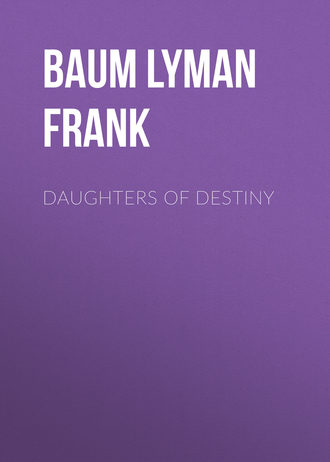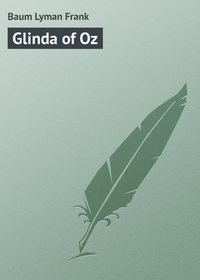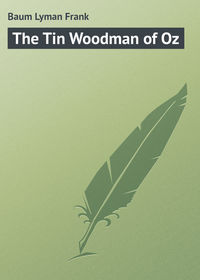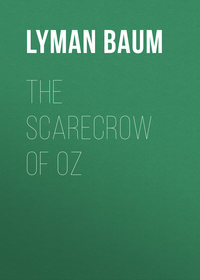 полная версия
полная версияDaughters of Destiny
David groaned.
“I am true man, most Excellency! I half neffer deceive. I neffer can deceive!
“We shall trust you,” said the doctor, gravely. “I feel quite certain you will never deserve to be stuffed with sawdust.”
“How absurd!” ejaculated Aunt Lucy. “Do give him a bath and some decent clothes, and stop bothering him. If we’ve got to have the fellow around let’s make him respectable.”
“That is a task that can only be performed outwardly,” returned the doctor, imperturbably. “But even that is worthy of consideration. Come, Allison, let us see what can be done toward the renovation of David.”
As the shuffling form of “the man who could speak English” disappeared through the archway, Aunt Lucy, who had been shrewdly studying his face, remarked oracularly:
“He’s playing possum. You mark my words, that Jew’s no fool. If he was, he wouldn’t be a Jew.”
CHAPTER XII
THE GIRL ON THE DIVAN
“Now this,” said the Colonel, “is to be a council of war. We are in grave difficulties, and may as well look the matter straight in the face.”
The little band of Americans seemed all to agree with him, for it was with fitting gravity that they turned their eyes upon the leader of the Commission – all except Aunt Lucy, whose wondering gaze was full upon little David, resplendent in his new costume. David’s outer robe was orange and white, and his inner garb brilliant green. An orange turban was twisted around his bald head and orange hose covered his stubby legs. This gorgeousness was due to a whim of the doctor, and it appeared to be eminently satisfactory to David. A native barber had trimmed and curled his straggling beard and the Jew had been scrubbed and scented so thoroughly that he had a fresh and wholesome look which was in strong contrast to his former unkempt condition.
“If he is to be our emissary and interpreter,” the doctor had said, “he must be made worthy of the great Commission, and in this barbarous country color is everything.”
“Then,” replied Aunt Lucy, “David is everything. He reminds me of a brass band on parade.”
David was now present at the council, seated between the Colonel and the doctor.
“In the first place,” resumed the leader, “we must acknowledge that we are virtually prisoners in this town, possessing no means in the way of animals or attendants of getting away. David has talked with the servants in this house and has discovered that we are guests of his Highness the Khan, who has ordered us supplied with every comfort that can be procured. Why the khan has taken an interest in our affairs – we being entire strangers to him – is a deep mystery. Unless he feels that he owes us some compensation for having driven Kasam out of Mekran.”
“Did he drive Kasam out?” asked Bessie.
“I understand from David that there is room for but one on the throne, and Ahmed Khan naturally prefers to sit there himself. So our friend Kasam made tracks and left us to shift for ourselves. All of the tribe of Raab, a powerful clan in Baluchistan, have deserted Ahmed and joined Kasam, who is in open revolt.”
“Would it not be safer for us to leave here and join Prince Kasam?” enquired Bessie.
“Why, I’m inclined to think, from the gossip David has picked up, that Kasam’s cause is a forlorn one, and that he’s not particularly safe himself. Ahmed Khan may wake up some day and poke him with a sharp stick. Moreover, there’s no disguising the fact that when our guide left Mekran and set up in business for himself he deliberately robbed us of the beasts we had bought and paid for with our own money, besides carrying off our Afghans, whose pay was fortunately in arrears. The Prince couldn’t well have treated us with less consideration, and in strong contrast with his actions Ahmed Khan has come to the front like a man and taken care of us. Let’s pin our faith to Ahmed Khan.”
“Cannot we induce Ahmed to supply us with a caravan?” asked Allison.
“That’s the point. That is, it’s one point. We mustn’t lose sight of the fact that we came here to get a right of way for the railroad. The first concession to get from the Khan is the right of way. The means to journey back to the railway at Quettah is the second consideration, although no less important. These things being accomplished, we will have performed our duty to the Syndicate and to ourselves.”
“When will they be accomplished?” enquired Aunt Lucy, in brisk, matter-of-fact tones.
“Ahem! That I cannot say, to a day, my dear Mrs. Higgins. The fact is, I’ve sent David twice to the Khan, with demands in writing for an interview. But David can’t get within a mile of the Khan, notwithstanding his impressive costume – which cost eight fillibees, native money.”
“The Khan,” added the doctor musingly, “is quite an exclusive personage. His Highness’ guards have threatened to tattoo our dear David unless he ceases to bother them.”
David groaned, thereby concurring in this statement.
“Then what is to be done?” asked Janet, who had displayed a lively interest in her father’s discourse.
The Colonel shook his head, rather despondently.
“What do you suggest, David?” asked the doctor.
David had been earnestly regarding the cabinet in which his gold was stored. Now, however, being addressed, he reluctantly withdrew his eyes from the vicinity of his treasure, heaved a deep sigh as if awakening from a happy dream, and said:
“Vy nod try de vizier?”
“What vizier?”
“De grant vizier, Agahr. He iss de biggest man here ven der Khan he iss somevhere else.”
“That seems a practical hint,” said the Colonel. “I’ll write a new letter, addressed to the vizier.”
David turned uneasily in his seat.
“Letters, most Excellency, iss a bad vay. Noboddy takes letters to Agahr de vizier. Dey go talk mit Agahr.”
“Will he see people?”
“Vy nod? He iss vizier.”
“Then one of us had best go and interview him, and take David along for interpreter,” decided the Colonel promptly.
“He speaks such lovely English!” added Aunt Lucy, with a toss of her head.
“The vizier won’t hear his English,” said the doctor, “and I suspect David’s native dialect is somewhat clearer and more comprehensive. Otherwise he’d have been murdered long ago. Now then, who’ll tackle the vizier?”
“I’ll go,” replied Allison, to the surprise of all. “I’m tired of hanging around doing nothing, and this mission promises a bit of excitement.”
“Very good,” said his father, pleased at the remark. “Be firm with him, Allison. Insist upon his securing an interview for me with the Khan, and also tell the vizier we want a caravan to take us to Quettah. Let him understand we have plenty of money to pay for what we require.”
“I’ll do the best I can,” said Allison. “Come, David.”
…Agahr had just awakened from his afternoon siesta and was sitting with Maie in a cool, darkened room. Both the vizier and his daughter were in a happy mood.
“There has been a more agreeable atmosphere at the palace since the Persian physician went away,” said the old man. “The fellow had a suspicious manner of looking at me, as if he knew all my secret thoughts and intended to betray them.”
“I hate the man!” exclaimed Maie, with a shiver of her rounded shoulders.
“And I,” answered Agahr. “But he is gone. Let us hope he will never return.”
“Yet the Khan liked him?” said the girl, enquiringly.
“They were old friends, although their ages differ so widely; and there is a secret between them, of some sort. The physician, who dominated everyone else, was very gentle with Ahmed.”
“That was his cunning,” declared Maie. “It is not wise to attempt to rule Ahmed Khan.” She broke off suddenly, and nestling closer to Agahr upon the divan she asked, in soft accents: “Do you think he is attracted toward me, my father?”
“He has eyes for no one else when you are by,” returned the vizier, fondly caressing the girl’s hand. “But that is not strange, my Maie. You are more beautiful than the houris of Paradise.”
She sighed, very gently, as if the tribute was sweet.
“And how does Ahmed Khan spend his days?” she enquired. “Do the dancing girls still amuse him?”
“He has sent all the dancing girls away,” was the reply, “and every inmate of Burah’s harem, both young and old, has been conveyed by Melka to the Castle of Ugg, far away in the South country.”
“I wonder why?” said the girl, thoughtfully. “Perhaps, having been a priest so long, he does not care for women.”
Agahr smiled.
“Then why is he improving and beautifying the harem? he asked.
“Is he?” she cried, starting up.
“The apartments of the women were turned over to an army of workmen a week ago. In another week the harem will be beautiful beyond compare. And the gardens and Court of the Maidens are being made magnificent with rare plants and exquisite flowers. That is not an indication, my beauty, that the Khan does not care for women.”
“True,” she returned, and sat as if lost in thought. Then she asked:
“What woman, besides myself, has the Khan looked kindly upon?”
“None,” answered the vizier, without hesitation. “It was only this morning he spoke to me of you, asking how many summers you had seen and saying you were rarely beautiful.”
She smiled contentedly.
“How wise we were, oh my father, to abandon the cause of the Pretender and ally ourselves with Ahmed Khan.”
“Kasam is too weak and unreliable to become a leader of men,” returned the vizier, calmly.
“Yet for years – while Burah Khan grew aged – I imagined I should become the queen of Kasam’s harem, and plotted shrewdly to place him upon the throne. Is it not amusing, my father, to remember that I learned to speak the awkward English tongue, just because Kasam had lived in England and spoke that language?”
“It was time wasted,” said the vizier. “But that reminds me that those American travellers are still in Mekran. I wonder why the Khan is keeping them.”
Maie started.
“Are there not women among them?” she asked.
“Two or three of the party are women.”
“Are they beautiful?”
Agahr laughed, and pinched her cheek.
“There are no beautiful women but ours,” he returned, “and of them you are the queen, my Maie! However, jealous one, the Khan has never looked upon these foreign women, nor does he care to.”
“Then why does he keep the Americans here? Will he permit them to build their railway?”
“Indeed, no,” said the vizier. “He agrees with me that a railway would ruin our country. But why he will neither see the Americans nor permit them to depart from Mekran is really a mystery.”
“Ah, I must discover it!” the girl exclaimed, earnestly. “When a thing is not understood it is dangerous. And it is well to beware of all women, even though they be foreigners and ugly of form and feature. I can manage any man who lives, my father, be he khan or vizier,” with a smile into his face; “but even the far-seeing Prophet failed to understand my sex aright.”
“I have put a spy in the household of the Americans,” said Agahr.
“Whom?”
“David the Jew.”
“David is clever,” said Maie, thoughtfully. “But will he be faithful? Gold is his only master.”
“I have promised, if David is faithful, to purchase from him those wonderful African pearls – at his own price. That will make him rich, and the pearls will be your bridal gift, my daughter.”
She clasped her hands, ecstatically.
“And the great diamond that David brought from Algiers? What of that?”
“The Khan himself has purchased it, by my advice.”
“Then it shall be mine!” she whispered. “You have done well, my father. How long has David been with the Americans?”
“Three days. I expect him here, presently, for the foreigners begin to grow impatient of restraint, and I have told David to let me quiet them with promises.”
“Question the Jew closely when he comes, concerning the Americans. I must know more of them, and we must watch them closely.”
The vizier arose, arranged his robe, and with slow steps left the room to cross a passage that admitted him to the apartment wherein he was wont to receive visitors on affairs of state. The fringe of the drapery caught as he threw it back, and hung partially open behind him; but neither he nor Maie, who still reclined upon her divan, noted this.
Scarcely was Agahr seated in his great velvet-lined chair of state when a slave entered to announce the arrival of David and the young American, who desired an audience.
The vizier hesitated, in deep thought, mindful of Maie’s injunctions. Finally he said to the slave:
“Admit David the Jew to my presence; but tell him the American must wait in the outer chamber until he is summoned.”
So presently little David entered the room, drawing the draperies closely behind him and then turning to bow cringingly before the vizier.
Allison waited impatiently. Why should Agahr wish to speak with David in secret? It looked decidedly suspicious, thought the young man, and after a few moments he arose and glanced down the passage. He seemed to be entirely alone, and the heavy rugs would deaden any sound of footsteps.
Stealthily he made his way down the passage toward the crimson draperies that had fallen behind David’s pudgy form. On his way he passed an entrance on the opposite side, to which the curtain hung half open, displaying the dim interior of the room. And then he paused as if fascinated, his eyes fixed upon the most exquisite picture he had ever beheld.
Maie lay carelessly stretched upon the divan, her robe thrown back, her arms crossed behind her head and the outlines of her rounded limbs showing daintily through the folds of soft mulle that enveloped them. Her eyes, languid and dark, gazed full into those of the intruder, and as she noted his enraptured face she smiled in a way that instantly robbed Allison of all caution or even a realization of his delicate position in this household. In two strides he was by her side, kneeling at the divan and clasping the unresisting hands of the girl in both his own.
“Oh, my darling!” he whispered, looking deep into the lustrous eyes, “how very, very beautiful you are!”
Such sincere tribute was beyond Maie’s power to resist. The little head might be full of ambitions, schemes and intrigues, yet there was room for a vivid appreciation of man’s adoration, and this abrupt method of wooing was sure to appeal to her Eastern imagination. She sighed, forgetful of all save the handsome face bent over her, and only the sound of her father’s stern voice coming from the opposite chamber had power to recall her to the present.
“You must go, my American,” she said, in clear English, “or you will be discovered.”
“Ah, you speak my language?” said Allison, in delight; “then you will understand me, sweet one, when I tell you how lovely you are – how passionately I adore you!”
He clasped his arms around her and drew her so close that her bosom rested against his own. The red lips were nearer now – so near that he kissed them again and again, in a very abandon of ecstatic joy.
“They will find you,” said Maie, softly. “And they will kill you.”
“What does it matter?” he rejoined, recklessly. “One moment such as this is worth a hundred deaths!”
With a sudden movement she freed herself from his embrace and sat up, facing him.
“Take this key,” she whispered, drawing it from her bosom, where it was secured by a silken thread. “It unlocks the Gate of the Griffins, at the end of our garden. Meet me there tonight – an hour before midnight – and take care you are seen by no prying eye. And now, go – and go quickly!”
She broke the thread and handed him a tiny silver key, which he thrust into his pocket.
“One kiss, sweetheart,” he begged; “just one more to comfort me until – ”
“Go, or all is lost,” she answered, almost fiercely, and seizing his arm she dragged him to another doorway and thrust him from the room with a force her slender form did not seem to warrant.
It was time. Allison heard footsteps and voices, and staggering through an ante-room he barely had time to reach the outer chamber and throw himself into a chair when David and a slave entered.
“Hiss goot Excellency, de vizier, vill see you,” said David, looking with open surprise into Allison’s flushed and excited face.
“I must have fallen asleep, David,” said the American, reaching out his arms as if to stretch them, “for I dreamed I was in Paradise, and you were imploring the Prophet to pardon my sins.”
David grinned, and turned to lead him to the vizier. But the Jew’s keen eyes had made a hasty survey of the room, and noted a curtain swaying gently where no breeze could ever have reached it.
CHAPTER XIII
A WILD WOOING
“Well?” asked the Colonel; “what luck?”
“None at all,” growled Allison. “The vizier is as tricky and sly as his master. He assumed a dignified and benevolent air, was very sorry we were discontented, but can do nothing to help us.”
“How about horses?”
“The vizier states it is an ecclesiastical command that no beasts of burden shall be sold to an infidel, under pain of death. His Highness the Khan regrets it; His Excellency the Vizier regrets it. You are referred to Aboullah O’Brien, Grand Mufti of the Mosque of the Angels, who issued the order to the faithful.”
“It iss Aboullah Beyren,” corrected David, meekly.
“How long has this order been in effect?” enquired the doctor.
“Since the day we arrived. It was not aimed at us, by any means. It was a coincidence.”
“That looks bad,” said the Colonel gravely. “How about my interview with the Khan?”
“The vizier will intercede for you. He will go down on his knees to His Supreme Mightiness; he will implore the Star of the Heavens to see you. But he doubts if we ever get within earshot of the Glorious and Magnificent Defender of the Faith, who is otherwise known as Ahmed Khan. It seems he has other fish to fry, and is busy getting them ready. We can do nothing with the scoundrelly vizier, I am certain.”
“Then we must depend upon David to get me an audience with the Khan. Americans are not accustomed to fail in what they undertake. See here, David,” turning to that worthy merchant; “can’t you bribe your way into the royal palace?”
“I will try, most Excellency,” answered David, eagerly. “But de bribe must be great moneys – grant moneys – many golt fillibees! Unt I promise nodding. Maybe I see de Khan; maybe nod. Who can tell?”
“It sounds like a risky investment, David,” remarked the doctor. “We’ll take time to think it over.”
They thought of many things, in the days that followed, but could arrive at no plan that promised to provide a caravan or give them an opportunity to negotiate with the Khan concerning the new railway.
The Colonel went personally to the palace one day, taking along the trembling David as interpreter. The official who met him at the entrance listened to him respectfully, but assured him that no message from an infidel could be carried to the Khan. Hints of money had no effect. It would cost him his head to disturb the Khan on such an errand.
Under these unfortunate conditions the Colonel began to be worried, and even the doctor lost much of his habitual cheerfulness. Aunt Lucy vowed vengeance upon every barbarian in Baluchistan, and promised the United States would wipe this miserable country off the map as soon as she returned and reported their treatment to her friend the senator.
But Allison, to the wonder of all, stopped grumbling and bore his imprisonment with rare fortitude and good nature. Janet also grew brighter and merrier day by day – a circumstance that did much toward reconciling her father to their enforced stay in Mekran. Bessie, always philosophic and gay, made no complaint of any sort. And so the days passed swiftly away and as yet brought no change in the fortunes of the stranded Commission.
One evening David came in greatly excited. A messenger had arrived from the Khan. Although that haughty potentate still ignored the Commission he had placed two saddle horses from his own stables at the disposal of the young ladies. If they would ride at daybreak on the following morning – that hour being the most cool and delightful of the day – the Khan would send a competent guard to protect them. His Most Serene and Magnificent Highness offered this courtesy in order to relieve the monotony of the young ladies’ stay in his capital. He made no mention of the other members of the party, who might exist as monotonously as ever. And the messenger awaited an answer.
This was, indeed, a startling proposition. Eastern women did not ride, yet the Khan seemed to know that nothing could be more acceptable to American girls than a dash across country on the back of a spirited horse. They were very glad to accept the favor, and the Colonel hoped it might lead in some way to more friendly relations between them and the ruler of Mekran, and perhaps result in the interview he so ardently desired.
“But who’s going to chaperon them?” enquired Aunt Lucy. “It seems I’m not invited.”
The Colonel thought the khan’s guard would be sufficient.
“But it’s a heathen country, and they’ll have to bandage their faces,” declared the old lady.
“We’ll wear veils until we are out of Mekran,” said Bessie. “Then there will be no masculine eyes to see us, and we’ll take them off.”
So at daybreak Janet and Bessie were ready for their ride, and soon a grizzled Baluch warrior rode up to the house leading two magnificent bays from the famous stables of Mehmet. The one that Janet rode was the very animal that had carried Ahmed on his swift journey from the monastery, and Bessie’s horse was but little inferior.
The warrior saluted and assisted the ladies to mount. It was Dirrag. He led them through the streets, around the palace enclosure and out at the south gate. A beautiful country lay spread before them, and as the keen morning air saluted their nostrils, brightened their eyes and flushed their cheeks, the girls dashed away at a canter with Dirrag silently following a few paces behind.
After their long confinement within the walls of a city dwelling this free, invigorating exercise was a great delight to the two girls, and they enjoyed the ride thoroughly. Passing through the city on their return they closely veiled their faces, yet were evidently objects of curiosity to those of the natives who were abroad so early.
Dirrag held the stirrups for them to dismount and then silently touched his cap and led the horses back to the khan’s stables. But next morning he was again at their door with the mounts, and their ride became a daily event to the girls.
Dirrag knew no English, but Janet and Bessie had come to understand many of the Baluch words – a dialect evidently founded upon Arabic – and could even speak a few simple sentences, learned by contact with the native servants and somewhat puzzling explanations from David. So the silence of their first rides began to be broken by laconic observations on the part of the battered old warrior, who seemed not to object to acting as escort to the charming infidel women. Occasionally they passed the house of Agahr the Vizier and Maie, who was informed of all that occurred in the capital, watched from her latticed window the graceful forms of the American girls riding by and on several occasions when they neglected to arrange their veils caught glimpses of their fair faces.
It was enough to set the vizier’s daughter wild with envy and chagrin. Why should the Khan favor these outcasts-these women of another world? Was it for them the harem was being prepared, despite her father’s protestation that Ahmed had never seen the foreign women nor ever would see them? The girl well knew that their beauty could in no way compare with her own in the eyes of any true Baluch. The Americans were deformed by being laced and belted at the waist and wearing heavy, close-fitting draperies that must not only be uncomfortable but were decidedly ugly in appearance. But Maie could not deny they sat their horses gracefully and with rare self-possession, and men have queer ideas of beauty. Perhaps Ahmed Khan might admire the novelty of their white faces, their queerly arranged hair and the pink finger nails that lacked any trace of the beautifying henna.
Maie was jealous, and with good reason. She had abandoned her handsome cousin Kasam for the more powerful and scarcely less handsome Ahmed Khan, and if fate destined her to lose them both she was surely to be pitied.









